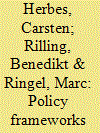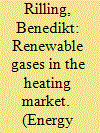|
|
|
Sort Order |
|
|
|
Items / Page
|
|
|
|
|
|
|
| Srl | Item |
| 1 |
ID:
093487


|
|
|
|
|
| Publication |
2010.
|
| Summary/Abstract |
The last 20 years efforts to find a long-term and large-scale biofuel alternative to petrol and diesel for the transport sector have been intensified with a focus on liquid biofuels, such as ethanol, methanol and Fischer-Tropsh diesel derived from wood. The large-scale production of biomethane has so far largely been overlooked in comparative studies that focus on the long-term renewable options. The aim of this article fills this gap and to provide a broad and systematic assessment of the future potential of biomethane compared to other biofuels. In order to become a large-scale option, biomethane production from woody biomass via gasification needs to be developed and commercialized. However, biomethane exhibits a clear development path with relatively low financial and technical risks starting with local solutions utilizing wet biomass resources towards medium and eventually large-scale gasification with economics similar to liquid second generation biofuels. The disadvantage of being a gaseous fuel is not insurmountable and can furthermore be relaxed by the integration and dual-use of the existing distribution system for natural gas. This assessment concludes that more emphasize should be given to biomethane as a large-scale option given the opportunity to use woody biomass from gasification.
|
|
|
|
|
|
|
|
|
|
|
|
|
|
|
|
| 2 |
ID:
103489


|
|
|
|
|
| Publication |
2011.
|
| Summary/Abstract |
Gaseous biofuels including biomethane, which has been shown to be more environmentally beneficial than liquid biofuels, should contribute to meeting the challenging UK targets set for the supplying of biofuels to the road transport fuel market. Under the Renewable Transport Fuel Obligations the financial incentives for the supply of biofuels have been volatile, e.g. 2008/2009 saw Renewable Transport Fuel Certificate values fall to zero. Any shortfall from the maximum value has significant implications for all biofuels. It is demonstrated that biomethane can be produced at a cost which is competitive with liquid biofuels and fossil fuels within the UK. Technologies such as water scrubbing, pressure swing adsorption and physical and chemical absorption are available to upgrade biogas generated by anaerobic digestion of organic wastes to transport fuel quality, and technologies such as membrane separation and cryogenic distillation are being modified for such an application. The manufacture and sale of biomethane as a transport fuel is also financially competitive with Combined Heat and Power. One limiting factor may be the additional cost of purchasing and maintaining biomethane fuelled vehicles. Support in this area could lead to the rapid expansion of biomethane transport fuel infrastructure and bring significant long term environmental and economic advantages.
|
|
|
|
|
|
|
|
|
|
|
|
|
|
|
|
| 3 |
ID:
178820


|
|
|
|
|
| Summary/Abstract |
Replacing natural gas with biomethane is an option to help decarbonize residential heating and cooling. But little biomethane is in the voluntary markets for heating. We examined biomethane-based gas tariff offerings in the UK, Germany, Austria and Switzerland, using qualitative content analysis and compared them to the national policy contexts. We find that current policies in all four countries under review clearly prioritize using biomethane for electricity generation and in transport, while leaving the heating market largely unregulated. Nonetheless, we find influence of policies on the heating market. Offerings in Germany show this influence in their biomethane content and underlying feedstock and in Austria regionality seems to be driven by grid charge regulations. If German policy makers want to channel more biomethane into residential heating, they are advised to harmonize competing support schemes for biomethane in electricity generation, transport and heating/cooling, waive mandatory CHP requirements, lower minimum biomethane content and to target existing, not just new, buildings. In the UK, the RHI should include residential buildings and using the Austrian refund system could help to develop biomethane tariffs from regional sources in Switzerland.
|
|
|
|
|
|
|
|
|
|
|
|
|
|
|
|
| 4 |
ID:
192717


|
|
|
|
|
| Summary/Abstract |
Renewable gases like biomethane or Synthetic Natural Gas (SNG) can play an important role in short-to mid-term decarbonization of the residential heating sector. By (partially) replacing the dominant natural gas, they accomplish two major goals: lowering CO2 emissions and lessening import dependencies. While existing research points to great production potential and technical options for producing renewable gases, the demand side has largely been neglected. Yet consumer decision making is highly relevant for climate change mitigation. Against this backdrop, we conducted a Discrete Choice Experiment with 512 heating consumers in Germany, a country with a high dependency on natural gas. We decomposed the gas tariff into six attributes (share of renewable gas, labels, regionality, biomethane feedstock, supplier type, and price) with varying attribute levels.
|
|
|
|
|
|
|
|
|
|
|
|
|
|
|
|
| 5 |
ID:
171465


|
|
|
|
|
| Summary/Abstract |
Europe is attempting to accelerate the development of renewables and, within the 2030 climate and energy framework, is required to achieve a share of renewable energy of at least 32%. However, the current share of renewables in the European transport sector (RES-T) is not adequate for reaching the 2020 target. The present work presents the trajectories of each Member State (MS) in attempting to achieve this goal and compares each MS in terms of RES-T, expressed in both percentage and per capita terms. Average European performance is used as a reference value. The results show that Sweden occupies a leading position, followed by Austria, Finland and France. At the same time, the trajectories of most MSs are not encouraging, but they may potentially be improved by the use of biomethane. This work analyses the strengths, weaknesses, opportunities and threats (SWOT) of this green gas. Several SWOT factors are examined and their relevance in a policy context is quantified using the analytic hierarchy process (AHP). The resulting integrated SWOT-AHP analysis defines a global factor priority. The work concludes that biomethane can potentially replace natural gas as a sustainable vehicle fuel, but its development is strictly linked to the adoption of governmental support programmes to stimulate market growth.
|
|
|
|
|
|
|
|
|
|
|
|
|
|
|
|
| 6 |
ID:
186493


|
|
|
|
|
| Summary/Abstract |
This paper addresses the decarbonisation of the heavy-duty transport sector and develops a strategy towards net-zero greenhouse gas (GHG) emissions in heavy-goods vehicles (HGVs) by 2040. By conducting a literature review and a case study on the vehicle fleet of a large UK food and consumer goods retailer, the feasibilities of four alternative vehicle technologies are evaluated from environmental, economic, and technical perspectives. Socio-political factors and commercial readiness are also examined to capture non-technical criteria that influences decision-makers. Strategic analysis frameworks such as PEST-SWOT models were developed for liquefied natural gas, biomethane, electricity and hydrogen to allow a holistic comparison and identify their long-term deployment potential. Technology innovation is needed to address range and payload limitations of electric trucks, whereas government and industry support are essential for a material deployment of hydrogen in the 2030s. Given the UK government's plan to phase out new diesel HGVs by 2040, fleet operators should commence new vehicle trials by 2025 and replace a considerable amount of their lighter diesel trucks with zero-emission vehicles by 2030, and the remaining heavier truck fleet by 2035.
|
|
|
|
|
|
|
|
|
|
|
|
|
|
|
|
|
|
|
|
|